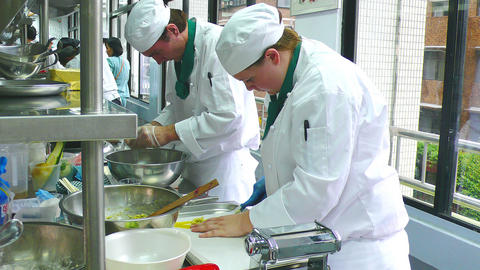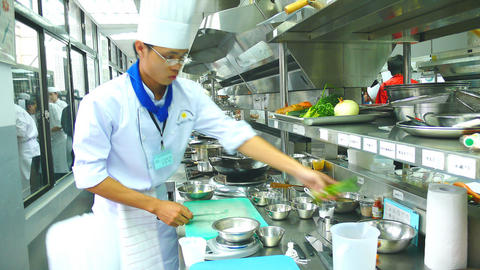The rain was pouring Monday afternoon, but that didn't dampen the excitement and anticipation pervading the well-equipped kitchen at the Taipei Kai-Ping Culinary School (台北市開平餐飲學校). Ten international teams of high school students from Taiwan, Japan, Australia, New Zealand, Vietnam, the Philippines and New Caledonia prepared for the International Secondary School Culinary Challenge rehearsal competition.
The two contestants from Kai-Ping school, which hosted the event, took home the silver medal at the contest Tuesday, adding another trophy to the school's list of awards. Through it's student-centered, self-learning curriculum, which differs sharply from the rigid, cramming approach that predominates in many schools, Kai-Ping is famous for its strong players in culinary competitions and for developing chefs for top-class restaurants at home and abroad.
Originally a comprehensive vocational school, Kai-Ping established its culinary department in 1991. After a series of experimental reforms launched by Hsia Hui-wen (夏惠汶) in 1989, it became the country's first and only professional culinary school.

PHOTO: HO YI, TAIPEI TIMES
Hsia was inspired on a visit to Australia, where he was impressed with the country's innovative approach to teaching, and students who were happy to go to school.
Changes seemed inevitable to the idealistic educator.
At Kai-Ping, textbooks were replaced with materials developed by teachers, many of whom come from the culinary industry. Rather than a traditional curriculum, an integrated approach with theme-oriented programs was devised by the faculty. This encourages students to learn actively rather than by rote. The aim is not to dictate what students should learn, but to allow them to acquire skills that interest them.

PHOTO: HO YI, TAIPEI TIMES
"Students at vocational schools are usually those who are wounded and frustrated in the junior high school system. Since the traditional approach to education fails to match their needs, here at Kai-Ping, we don't focus on grades, but attempt to foster abilities to create, communicate and collaborate with others," said Wang Hsiou-fen (王秀芬), head of the comprehensive planning department.
From group discussion, proposal-writing and oral presentations to creating exhibitions and parties, students learn computer, language and communication skills from experience. History and geography lessons can be picked up in introductions to the regional and cultural diversity of the culinary arts. Music and art lessons are run alongside food presentation, menu design and restaurant music classes.
"For students interested in Western cuisines, English-language skills are necessary to study menus, and this gives them motivation to learn the language. Systematic education can only work effectively after students' interests are generated and they are willing to engage in the learning process, knowing exactly what they want," Wang said.
To senior Chen Kuan-yu (陳冠宇), three years at Kai-Ping proved far more rewarding than expected.
"I wasn't exactly a straight-A student in junior high school and wanted to learn a professional skill. I figured that since I was always interested in cooking, I could apply for Kai-Ping. My parents were very supportive of my decision because they believed that I should plan my future myself," Chen said. "When I first started the program, I was truly surprised that there really weren't any textbooks for classes … . My classmates all have great fun going to school every day."
Volunteering to enter the self-learning program, Chen is among the students who choose to set up their own learning patterns and schedules with teachers in one-to-one sessions, much akin to tutorials on graduate programs. With three simple regulations (no fighting, no drugs and no infringement of other people's privacy and property), the school keeps an open mind towards curriculum planning and welcomes students to discuss with the faculty different learning preferences that may fit their individual needs.
For the faculty at Kai-Ping, the working environment also requires initiative and high spirits to face challenges. As each member of the faculty is considered an active participant in educational reform, students' daily homework is to keep a field study report - a log of what they have seen, heard and experienced during the day, the material used and possible future modifications.
Every Wednesday morning, Chen said, all students have the chance to sit down with the faculty members as equals and make their feelings and opinions known and comment on just about anything. Such is the liberalism exercised at the school where entry exams were replaced with interviews.
Preliminary meetings are held to ensure that both parents and students understand the school's nonconformist approach to education. The parents of incoming freshmen are required to attend summer workshops to experience the way their children will learn to prevent complaints that the students have no textbooks and learn in an unconventional way.
"It's our job to let parents know that each child learns at their own pace. In the traditional educational system, the immediate result of learning is grades. It gives a sense of security but isn't a fair representation of students' capabilities. What we try to communicate to parents is that all children are different. We need to offer assistance when it's called for and grow along with them," Wang said.

On April 26, The Lancet published a letter from two doctors at Taichung-based China Medical University Hospital (CMUH) warning that “Taiwan’s Health Care System is on the Brink of Collapse.” The authors said that “Years of policy inaction and mismanagement of resources have led to the National Health Insurance system operating under unsustainable conditions.” The pushback was immediate. Errors in the paper were quickly identified and publicized, to discredit the authors (the hospital apologized). CNA reported that CMUH said the letter described Taiwan in 2021 as having 62 nurses per 10,000 people, when the correct number was 78 nurses per 10,000

As we live longer, our risk of cognitive impairment is increasing. How can we delay the onset of symptoms? Do we have to give up every indulgence or can small changes make a difference? We asked neurologists for tips on how to keep our brains healthy for life. TAKE CARE OF YOUR HEALTH “All of the sensible things that apply to bodily health apply to brain health,” says Suzanne O’Sullivan, a consultant in neurology at the National Hospital for Neurology and Neurosurgery in London, and the author of The Age of Diagnosis. “When you’re 20, you can get away with absolute

May 5 to May 11 What started out as friction between Taiwanese students at Taichung First High School and a Japanese head cook escalated dramatically over the first two weeks of May 1927. It began on April 30 when the cook’s wife knew that lotus starch used in that night’s dinner had rat feces in it, but failed to inform staff until the meal was already prepared. The students believed that her silence was intentional, and filed a complaint. The school’s Japanese administrators sided with the cook’s family, dismissing the students as troublemakers and clamping down on their freedoms — with

As Donald Trump’s executive order in March led to the shuttering of Voice of America (VOA) — the global broadcaster whose roots date back to the fight against Nazi propaganda — he quickly attracted support from figures not used to aligning themselves with any US administration. Trump had ordered the US Agency for Global Media, the federal agency that funds VOA and other groups promoting independent journalism overseas, to be “eliminated to the maximum extent consistent with applicable law.” The decision suddenly halted programming in 49 languages to more than 425 million people. In Moscow, Margarita Simonyan, the hardline editor-in-chief of the